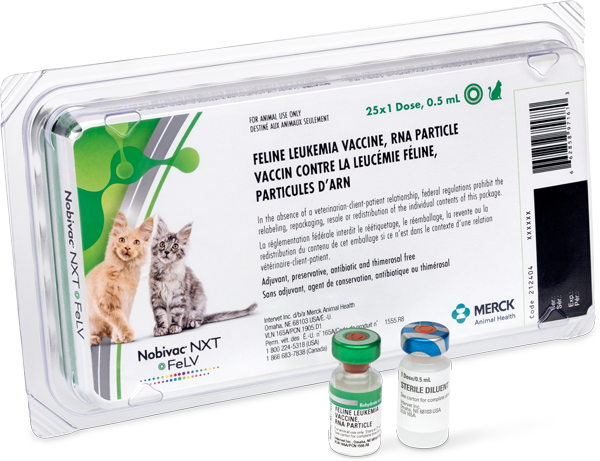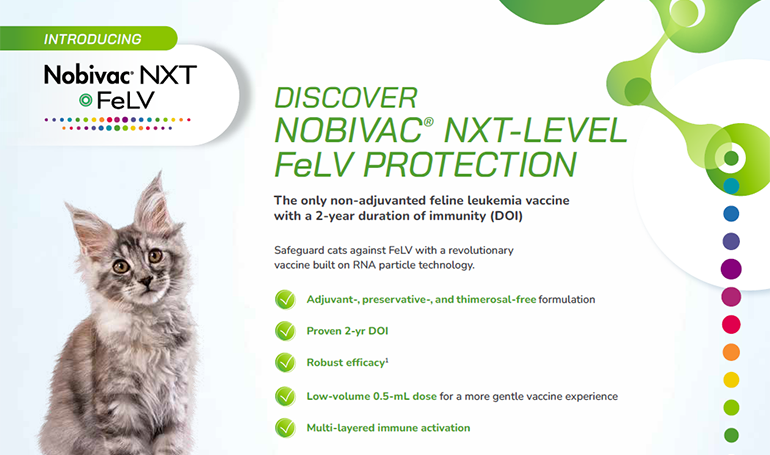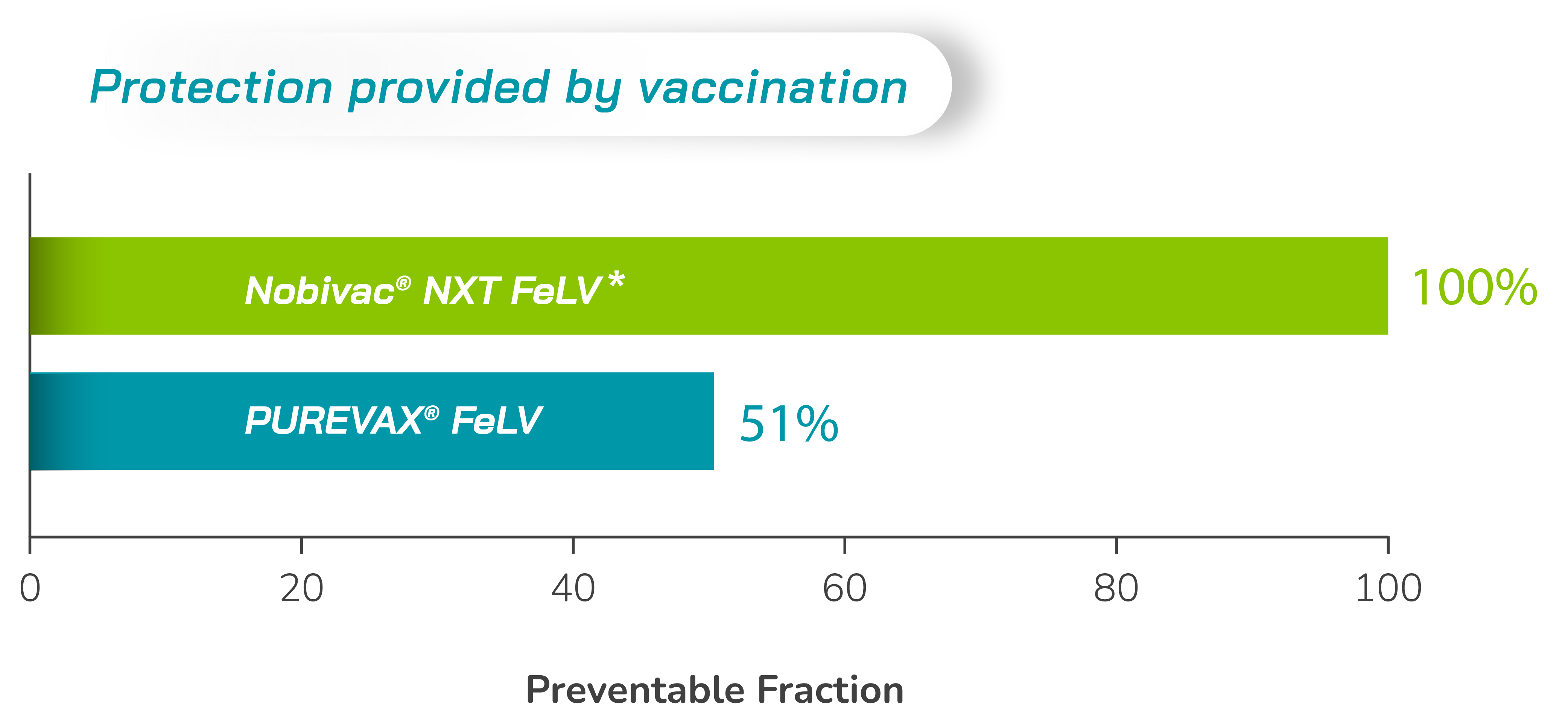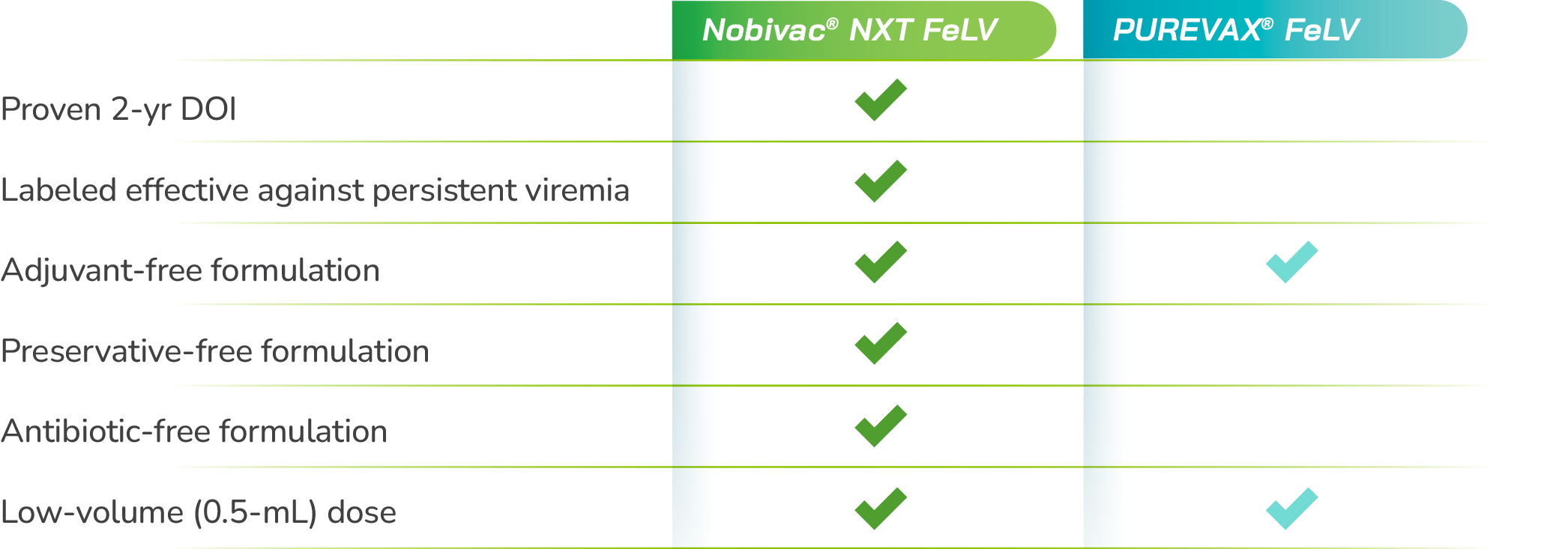
Nobivac® NXT FeLV
Discover the first and only non-adjuvanted feline leukemia virus (FeLV) vaccine to use RNA particle technology to generate an efficient, comprehensive immune response.


Nobivac® NXT (next) FeLV is the latest innovation in feline leukemia protection. Nobivac® NXT uses revolutionary RNA particle technology to deliver safe, robust, multi-layered protection.
Features & Benefits
No extraneous material
Delivers comprehensive immunity in an adjuvant-free, preservative-free, thimerosal-free formulation
A gentle formulation
Low-volume 0.5-mL dose for a better overall vaccine experience
Robust efficacy
Next-level protection1
Multi-layered protection
Stimulates a complete immune system response with an extended, 2-year duration of immunity
How It Works
Discover the science behind Nobivac® NXT-level RNA particle technology. See how this revolutionary new way of delivering protection provides an exciting new option for you and your patients.
Downloads

NOBIVAC® NXT FeLV
Fight feline leukemia virus with revolutionary RNA particle technology in a non-adjuvanted, low-volume vaccine.
No items to show.
Product Specifications
Administration
For primary immunization, administer 1 dose (0.5-mL) subcutaneously as early as 8 weeks of age followed by a second dose administered 3 to 4 weeks later
Indication
Effective for vaccination of healthy cats, 8 weeks of age or older, against feline leukemia virus. The duration of immunity is at least 2 years. Also shown to be effective against persistent viremia in cats exposed to virulent feline leukemia virus
Supplied
25 doses per tray
Safety
Safe in kittens as young as 8 weeks of age4
Uncompromising Safety and Efficacy

7 of 8 kittens in the control group became persistently antigenemic compared with 3 of 7 kittens in the PUREVAX® FeLV group and 0 of 8 kittens in the Nobivac® NXT FeLV group who received an initial vaccination series.1 *
*Kittens were tested weekly from 3 to 12 weeks post challenge for the presence of antigenemia.


Demonstrated safety under field conditions
Disease Information
FeLV is a retrovirus that replicates within many tissues, including bone marrow, salivary glands, and respiratory epithelium.2
The percentage of cats infected with FeLV varies depending on age, health, environment, and lifestyle.3
Bite wounds, mutual grooming, and rarely sharing food or water dishes are all means of transmission.3
FeLV in saliva, nasal secretions, urine, and feces can be transmitted during intimate contact with infected cats. Kittens can acquire the virus from infected mothers while still in the womb or through nursing.3
FeLV does not result in predictable clinical signs. Rather the clinical signs vary depending on the course of infection in the individual cat.
Common examples may include:
- Fever
- Loss of appetite
- Weight loss
- Diarrhea
- Swollen lymph nodes
- Pale or inflamed gums
- Lives in a multiple cat household
- Is a rescue cat or from a feral cat population
- Kittens are at higher risk of infection than adult cats3
- Outdoor cats are at higher risk
- Unvaccinated cats

NOBIVAC® NXT-GENERATION PROTECTION
Learn more about Nobivac® NXT technology, the latest vaccine platform from Nobivac®.
All trademarks are property of their respective owners.
References
- Carritt K, Davis R, Stachura K, Mogler M, Xu Z, Tarpey I. An RNA particle vaccine expressing feline leukemia virus envelope protein protects against virulent FeLV challenge. Abstract presented at: ISCAID Symposium 2024; October 14-16, 2024; Vancouver, Canada.
- Sykes J. Greene’s Infectious Diseases of the Dog and Cat, 5th ed. Elsevier; 2023:382-413
- Cornell University College of Veterinary Medicine Feline Health Center. Feline leukemia virus brochure. Accessed August 19, 2024. https://www.vet.cornell.edu/departments-centers- and-institutes/cornell-feline-health-center/health-information/feline-health-topics/feline-leukemia-virus-brochure
- Nobivac® NXT FeLV. Product Label. Merck Animal Health.



